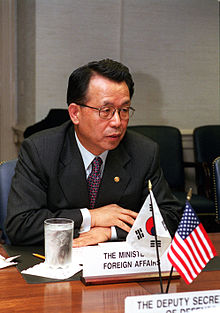Han Seung-soo
|
|
|
| Korean spelling | |
|---|---|
| Hangeul | 한승수 |
| Hanja | 韓 昇 洙 |
|
Revised Romanization |
Han Seung-su |
|
McCune- Reischauer |
Han Sŭngsu |
Han Seung-soo (born December 28, 1936 in Shunsen , Kōgendō Sub - Province, Chōsen Province , former Japanese Empire , today's South Korea ) is a South Korean politician and diplomat . Han was Prime Minister of South Korea from February 29, 2008 to September 28, 2009 . He was previously both foreign , trade , economic and finance ministers and deputy prime minister of his country, and President of the 56th session of the General Assembly of the United Nations .
academic career
Han Seung-soo received a bachelor's degree in political science from Yonsei University in 1960 and an MA from Seoul National University in 1963 ; in 1968 he received his PhD in economics from the University of York , England . He received an award from the European Community for his doctoral thesis “The Growth and Function of the European Budget” .
From 1970 to 1988 he was full professor of economics at Seoul National University, and from 1986/87 he was also visiting professor in Tokyo .
In addition, he was a consultant for the United Nations Economic Commission for Asia and the Pacific (ESCAP ) and the World Bank , from the latter he was sent to Jordan in the late 1970s as an advisor to the government there.
He later became a special visiting professor at the Academy for International Studies at Yonsei University in Seoul and honorary professor at York University, England.
Political career
In 1988 Han Seung-soo was elected to the parliament of South Korea, of which he is a member to this day (as of March 2006). 1988–1990 he was the Minister of Commerce of South Korea. In 1993/94 his country sent Han as ambassador to the USA before President Kim Young-sam appointed him his cabinet chief in 1994 ; This office was followed in 1996 by the appointment of deputy head of government and finance and economy minister, which he held until 1997. During his term of office, the Republic of Korea joined the OECD and South Korea's first offer of assistance to North Korea to supply rice.
In April 2001 he finally became Foreign Minister. As this he was elected President of the 56th session of the General Assembly of the United Nations in September of the same year . In this role, Han received the 2001 Nobel Peace Prize for the UN . After the end of his tenure as President of the UN General Assembly, he also resigned as Foreign Minister of South Korea. In 2007, Han, along with Gro Harlem Brundtland and Ricardo Lagos, was appointed special envoy for climate issues by UN Secretary-General Ban Ki-moon .
On January 28, 2008, the new President of South Korea elected in December 2007, Lee Myung-bak, announced that he would propose Han as the new Prime Minister after his inauguration on February 25, 2008. The South Korean parliament approved the proposal on February 29, 2008 with a large majority.
In the parliamentary elections on April 9, 2008, Hans's party Hannara-dang won an absolute majority of the seats. However, on June 10, 2008, Han and all ministers in his cabinet offered to resign. This step was preceded by massive popular protests against current plans to lift the 2003 ban on beef imports from the USA. The import ban had been decided because of the then rampant BSE epidemic . Large sections of the population accused the government of neglecting security checks and of putting people's health at risk.
Web links
- Biography with photo of Han Seung-soo on the homepage of the UN regional office - UNRIC (as of 2001) ( German )
Individual evidence
- ↑ International Herald Tribune : UN secretary general appoints three special envoys on climate change from May 1, 2007.
- ^ The Korea Times : Assembly Endorses Han as Prime Minister, February 29, 2008.
- ↑ Tages-Anzeiger : Conservatives win majority in South Korea from April 10, 2008.
- ↑ Der Spiegel : Government offers resignation from June 10, 2008
| predecessor | Office | successor |
|---|---|---|
| Han Duck-soo |
Prime Minister of the Republic of Korea from February 29, 2008 to September 28, 2009 |
Chung Un-chan |
| personal data | |
|---|---|
| SURNAME | Han, Seung-soo |
| ALTERNATIVE NAMES | 한승수 (Hangeul); 韓 昇 洙 (Hanja); Han, Seung-su (revised Romanization); Han, Sŭngsu (McCune-Reischauer) |
| BRIEF DESCRIPTION | South Korean politician and diplomat |
| DATE OF BIRTH | December 28, 1936 |
| PLACE OF BIRTH | Shunsen , Kōgendō Sub - Province, Chōsen Province , former Japanese Empire , today's South Korea |

